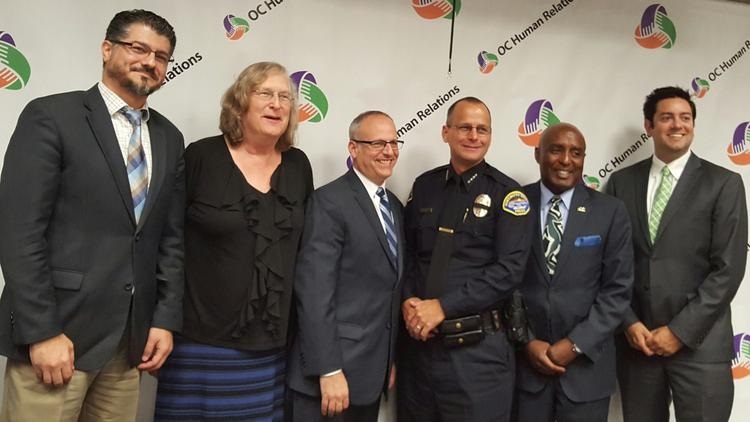Los Angeles Times, August 5, 2016
By Ahn Do,

Hate crimes panelists, from left: Hussam Ayloush, CAIR-LA; Michelle Evans, TG Rainbow; Rabbi Richard Steinberg, Shir Ha-Ma’a lot; Robert Handy, Huntington Beach Police; Bill Lewis, 100 Black Men of Orange County; Jess Rodriguez, OC District Attorney’s office. (Anh Do/Los Angeles Times)
The owner of an Islamic clothing store arrived at her Anaheim shop one morning, stunned to see a Quran left at her front door sprayed with 20 bullet holes.
An African-American man from Los Alamitos was assaulted at work by a white man who screamed, “You f—— n—– … I’m going to come back and shoot you.”
A young transgender Hispanic woman was beaten after she spoke up to protest abusive names her attacker hurled at her.
Those and other episodes of violence and bias were among incidents highlighted in a study released Thursday that found that reports of hate crimes in Orange County rose 10% in 2015. The most frequent target, according to the tally, was the LGBT community with 11 incidents, four of them aimed at people who are transgender.
The Orange County Human Relations Commission study separated hate crimes from hate incidents — behavior motivated by bias but not rising to the level of a crime. Hate incidents increased dramatically, from 14 in 2014 to 43 in 2015, mainly targeting Muslims and those thought to be Muslim, including the Sikh community.
Members of the African-American and Jewish communities reported seven hate incidents in each. Among them, residents in Orange awoke on a Sunday to find fliers on their lawn, urging them to sign up and support the “Orange County KKK.” The leaflets listed questionable statistics about black and Hispanic crime trends along with a reference to “lies from the Jewish media.”
The spike in Orange County hate crimes reflects the racially charged political and religious climate nationwide, according to experts.
Hate crimes are “incredibly corrosive crimes,” and they usually affect more than just the immediate victims but others “in the vicinity,” said Mark Potok, a senior fellow at the Southern Poverty Law Center, a Montgomery, Ala.-based civil rights group which tracks such crimes. For example, the burning of a cross targeting an interracial couple may cause emotional distress for other interracial couples nearby, he said.
Potok spoke via Skype before a Santa Ana panel discussion where members of the Human Relations commission shared their findings. The increase in reported hate crimes, he said, parallels a national increase in hate crime groups, which grew by 14% in 2015, including chapters of the KKK and black Separatist groups.
While hate crimes against African Americans in Orange County decreased for the 4th year, an overall spike in hate crimes is cause for worry, said Rusty Kennedy, the commission’s executive director. He said his staff is working to boost outreach, urging more people to come forward to share the discrimination they experience — even if it’s tough to talk about it.
“Victims are left scared, shaken, but they need to know that awareness can work to fight against these crimes,” said Jim Armendaris, a program manager for the commission.
Hate crimes began to rise in 2008 with the election of Barack Obama, the first president of African-American descent, according to the Southern Poverty Law Center. As voters move toward another presidential election this November, panelists gathered Thursday pointed to the rhetoric from Republican nominee Donald Trump, saying it has sparked division.
“When you have prominent people normalizing hatred, it gives a green light” for others to act on their beliefs, said Hussam Ayloush, executive director of the Greater Los Angeles chapter of CAIR, the Council on American Islamic Relations.
“Ignorance should lead to curiosity, instead of having people feel fear,” said Michelle Evans, spokeswoman for TG Rainbow, a transgender support group.
Other panelists debated why residents may be wary of calling police to identify themselves as victims of hate crimes or hate incidents — and how community leaders can help.
“Not one number is acceptable,” said Rabbi Richard Steinberg of Shir Ha-Ma’a lot, a synagogue in Irvine, referring to hate crime reports.
Police Chief Robert Handy of Huntington Beach said his department has a number of initiatives to improve relations with those who may feel marginalized, including partnering with LGBT groups “to build understanding” and a program that provides Spanish-speaking residents with instruction about police operations.
Bill Lewis, representing 100 Black Men of Orange County, said his group devotes countless hours to working with young African-American men, providing mentoring and counseling, hoping to erase stereotypes they have of other minorities as well as negative attitudes directed at them.
For victims still frightened of sharing their experiences, the simplest solution may be to log onto the commission website and fill out a report, Steinberg said.
“Some people don’t even know the definition of a hate crime,” added Jess Rodriguez, an Orange County deputy district attorney assigned to prosecute such crimes. “Ask us,” he said. “We can help.”

